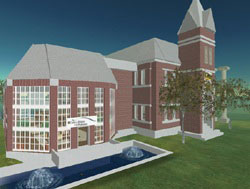|
||
| Return to CORP homepage |
Center launches virtual campus in Second Life
Debra L. Mason, director of the Center on Religion & the Professions, said it was important for MU to have a presence on Second Life, "alongside the several hundred other educational institutions that use this virtual world to teach, research and explore the meaning of reality, communication and relationships." The exterior of the Second Life campus buildings are a virtual rendering of the Donald W. Reynolds Journalism Institute, due to open next year on the real-life Missouri-Columbia campus. Inside are exhibits and direct links to resources on Missouri School of Journalism web sites and affiliated organizations. The virtual campus also houses The Center for Understanding Religion in Second Life, a working group with the purpose of promoting dialogue between the academic community and the Second Life public on religion and ethics topics, including the role of religion in public life. The Center is an affiliate of the Missouri School of Journalism and a project of the Center on Religion & the Professions. After learning that an MU virtual campus had not yet been created, Mason realized it made sense for the Center on Religion & the Professions to do so, she said, because "religion has always been an 'early adapter' of technology." The virtual campus includes space for public and private gatherings and classes, displays and research. Facilities include multimedia, a theater, conference seating and a garden to display art. The site will stream KBIA radio and other real-world feeds. The campus is located on the Teaching 4 sim, a space coordinated within Second Life by the New Media Consortium that also hosts many other universities and colleges in the virtual world. The Missouri campus also has use of group conference and multimedia facilities on the sim. "Being housed in the School of Journalism, we're expected to study and learn about emerging mass communication technologies - both their benefits and their dangers," Mason said. "Our site helps us do that. Second Life gives international visibility to MU and showcases, with links to our professional media, why the school is so good at what it does." Researchers will be able to host events and explore individually using the campus as a base. Guest lecturers and artists also will be encouraged. With its international audience, Second Life presents a unique opportunity to consider multicultural concerns, including issues of diversity and the meaning and shape of community in virtual worlds. The Second Life campus was built by Kate Fox Studio, a web editing and consulting firm specializing in services for educational and nonprofit organizations. |
Links in archives are not maintained. |


 June
20, 2007 - The Center on Religion &
the Professions, an affiliate of the School of Journalism at the University
of Missouri-Columbia, has launched a virtual campus in the online world Second
Life. The site is a virtual campus and research facility for the University
of Missouri faculty and staff and related organizations.
June
20, 2007 - The Center on Religion &
the Professions, an affiliate of the School of Journalism at the University
of Missouri-Columbia, has launched a virtual campus in the online world Second
Life. The site is a virtual campus and research facility for the University
of Missouri faculty and staff and related organizations.